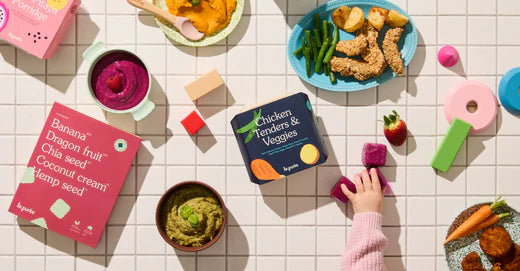Written by: Accredited Practising Dietitian, Jess Kurosaki
Salt vs. Sodium: What is the difference, and how are we supposed to manage feeding our babies salt-free food when sodium appears to be in… everything?! Let’s start at the beginning.
Salt and Babies
Sodium is a naturally occurring mineral. It is naturally present in many foods- including breast and formula milks, eggs, dairy and meat. Sodium is a nutrient our bodies can absorb, and babies have an innate capacity to manage sodium in their diet (as compared to salt). Sodium is essential for maintaining proper fluid balance, nerve function, and muscle activity, but babies' kidneys are not fully developed to handle high levels. When sodium is combined with Chloride- it forms salt (NaCl).
The Australian Guidelines tell us to avoid adding salt into babies’ food before 12 months of age. This doesn’t mean they need to live in a bubble without access to the foods your family is enjoying, it’s simply to make informed choices for their diet- at least until they have reached 12 months of age.
In a nutshell- focusing on whole foods, and limited processed foods will ensure their diet is low in salt.
The sodium they receive from whole foods like dairy, eggs and meat is managed well by their kidneys, and there is no reason to limit these foods in order to limit sodium. They form a healthy, essential part of their diet.
Avoiding excess salt, however- is a different story!
What salt can my baby have?

It’s important for babies to be offered meals which have been cooked without a bucketload of added salt, flavour enhancers, commercial stocks and sauces in cooking. Limiting these to a reasonable level (not necessarily zero) guarantees that your recipes will be low in salt.
Offering babies food without condiments is another way for them to fully experience the flavour of a food, without masking it in salt (and sugar).
Packaged Foods
Processed cheeses and deli meats are a source of salt that is easily avoidable, as these food sources contain salt in excess amounts. Babies can obtain protein from the fresh and unprocessed forms of these foods, without relying on deli meats which burden their kidneys.
All packaged snacks - sweet or savoury (especially savoury), will have salt added. This is simply to preserve them. Avoiding packaged snacks for babies under 1 will mean that the fresh and whole foods making up their diet will give their kidneys the absolute best chance of healthy development before these convenience items are likely going to be included (hopefully in moderation) into their diet.
Best Ways To Avoid Excess Salt For Your Baby
Foods to be mindful of, usually with high levels of salt:
- Condiments- tomato and BBQ sauces, soy sauce, aioli, fish sauce, mustard and mayo
- Deli meats, cured meats and smoked fish (e.g. smoked salmon)
- Pickled veggies, like pickles and olives
- Hard cheeses, especially aged cheese- e.g. parmesan
- Packet snacks such as chips, popcorn, salted nuts, pretzels, some puffs and crackers
- Frozen and pre-made meals such as nuggets and pizzas.
Best Ways To Keep Your Babies Salt Intake Low

Below is a list of ways you can support a lower-salt diet for your little ones:
- If home cooking, set aside a position for bub before adding stock, soy sauce, salt.
- Home cooking > takeout or restaurants (when possible!)
- Use Le Puree’s salt-free Bone Broth in cooking.
- Cook with lean protein and meats rather than processed deli meat or smoked fish.
- Lean on fresh herbs and spices- such as rosemary, basil, thyme and parsley.
- Switch the soy sauce and fish sauce in your fridge to the sodium-reduced versions.
- Start with less salt than a recipe suggests and taste test before adding more.
- Dilute sauces and seasonings for bub (e.g. say sauce) with water.
Salt is in our environment, and as Australian adults- our diet is overly loaded with it. If we can give our little people the absolute best chance of avoidance of processed, salty, additive-filled foods before they’re included in their diet- we’ll be doing them a huge favour!
Sources
https://www.sciencedirect.com/science/article/pii/S0929693X23001562?via%3Dihub



